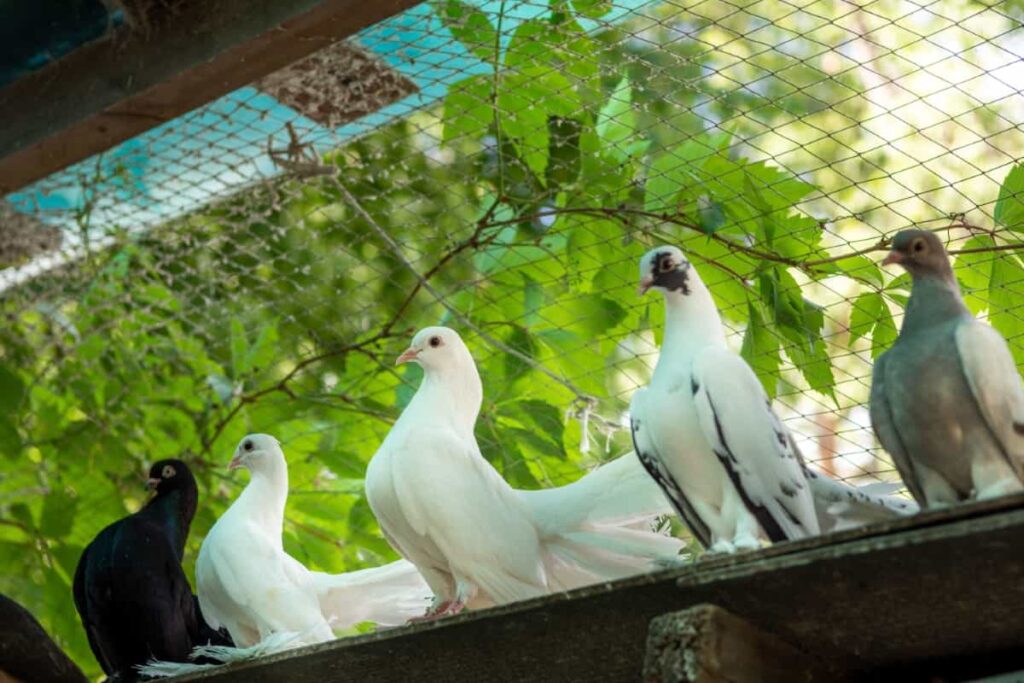Starting a small commercial pigeon farming can be a unique and rewarding venture. Pigeon farming, also known as pigeon keeping or pigeon breeding, can be pursued for various purposes such as meat production, egg production, racing, and pets. Before you embark on this endeavor, it’s essential to create a comprehensive business plan to guide you through the process. Here are the steps to help you get started.

The Ultimate Guide to Breeding Pigeons for Profit
Pigeon Farming Business Plan
- Market Research: Analyze the demand for pigeon products and identify your target market.
- Infrastructure: Detail the required facilities, including cages, feeders, and nesting areas.
- Breeding Stock: Choose healthy pigeons and outline a breeding strategy.
- Nutrition: Develop a balanced feeding plan for optimal growth and health.
- Healthcare: Establish a veterinary care routine to prevent and address diseases.
- Marketing Strategy: Define how you will promote and sell your pigeon products.
- Regulations: Research and comply with local regulations for livestock farming.
Pigeon Coop Designs/housing for Small-Scale Farmers
For small-scale pigeon farm business, a practical pigeon coop design should ensure at least 2 square feet of space per pigeon. Optimal dimensions include a 4×8-foot structure with proper ventilation, roosting perches, and easy-access nesting boxes. Construct the coop with durable materials, providing adequate insulation against extreme weather conditions.
Employ a simple yet effective waste management system for easy cleaning. Incorporate a secure locking mechanism to prevent predator access. This space-efficient design allows for efficient utilization of resources while promoting the health and productivity of the pigeon flock, making it suitable for small-scale farming operations.
Feeding Your Pigeons for Optimal Health
Provide a balanced diet for optimal pigeon health. Offer pigeon feed with a mix of grains, seeds, and legumes, ensuring a protein content of 12-15%. Feeding for healthy pigeons involves feeding pigeons twice daily, offering 30-50 grams per bird per meal. Supplement their diet with fresh vegetables like lettuce, spinach, and grated carrots. Include grit for digestion and calcium.
Provide access to clean and fresh water at all times. Monitor weight and adjust portions accordingly. Avoid feeding excessive bread or processed foods. Regularly clean feeding areas and containers. Consult with a veterinarian doctor for specific dietary recommendations based on your pigeon’s health and individual needs.
Raising Pigeons for Eggs
Pigeons are not typically raised for egg production like chickens. While pigeons do lay eggs, they are not as prolific egg layers as chickens. In a year, a pair of pigeons can produce several clutches of eggs. Still, the exact number can vary based on factors such as the pigeon breed, environmental conditions, and the availability of food. On average, pigeons may lay about 18 to 20 eggs per year, with each clutch usually consisting of two eggs. The incubation period for pigeon eggs is around 17 to 19 days, and after hatching, the squabs (young pigeons) require care and feeding for a few weeks.
Understanding Pigeon Behaviour: Tips for Successful Farming
- Provide a clean, well-ventilated loft with ample space for pigeons to move and roost comfortably.
- Install secure nesting boxes for breeding pairs to encourage reproduction.
- Offer a balanced diet of grains, seeds, and grit to meet their nutritional needs.
- Ensure a supply of fresh water to keep pigeons hydrated.
- Regularly check for signs of illness and promptly address any health issues.
- Pigeons are social; keep them in pairs or groups for companionship.
- Train pigeons for better handling and cooperation.
- Protect against predators and secure the loft to prevent escapes.
- Maintain a clean environment to prevent diseases.
- Observe pigeon behavior to detect changes and address issues promptly.
In case you missed it: 45 Days Chicken Business Plan: Investment, Cost, Profit for 45-Day Cycle Broilers

Managing Health and Diseases in Pigeon Farming
Provide a clean and well-ventilated environment to prevent the spread of diseases. Implement a strict hygiene routine, regularly cleaning cages, feeders, and water containers. Ensure a balanced and nutritious diet to boost immunity. Monitor pigeons for signs of illness, such as changes in behavior or appearance. Promptly isolate and treat sick birds to prevent the spread of infections.
Pigeon farming may face diseases like Trichomoniasis, Coccidiosis, and Salmonellosis. To manage these, maintain a clean environment, regularly disinfect cages, and provide clean water. Use medications like metronidazole for Trichomoniasis and amprolium for Coccidiosis under veterinary guidance. Implement strict biosecurity measures to prevent Salmonellosis. Vaccinate against major infections like Paramyxovirus. Monitor flock health, isolate sick birds promptly, and provide a balanced diet for robust immune function.
The Economics of Pigeon Farming: Cost Analysis and Profit Potential
Cost to Start a Pigeon Farming Business
Starting a pigeon farm business involves initial expenses such as acquiring pigeons, constructing coops, purchasing feed, and ensuring adequate veterinary care. The cost of pigeon farming varies based on scale and location, with factors like coop size and equipment influencing the overall investment. Initial expenses may range from $5,000 to $10,000, including permits and licensing.
Average Pigeon Farming Business Profit
Profitability in pigeon farming hinges on market demand for pigeons, racing, and pigeon-related products. Revenue sources include meat sales, racing competitions, and breeding. While profit margins can fluctuate, a well-managed pigeon farm can yield steady income. Marketing strategies, breeding programs, and health management play crucial roles in enhancing profitability.
In case you missed it: Backyard Poultry Farming in the Philippines: Best Chicken Breeds to Raise in Backyards of the Philippines

Successful pigeon farmers can potentially achieve a sustainable income, but careful planning and ongoing management are vital for long-term success in this niche market. On average, a well-managed pigeon farm can yield pigeon farming profits ranging from $5,000 to $20,000 annually.
Sustainable Pigeon Farming Practices for Environmental Conservation
- Design pigeon farms to mimic natural habitats, reducing stress and promoting natural behavior.
- Utilize organic, locally sourced feed to minimize environmental impact and promote health.
- Implement water-saving technologies and practices to reduce water consumption.
- Employ efficient waste disposal methods, such as composting, to minimize environmental pollution.
- Engage in selective breeding programs to enhance genetic diversity and resilience.
- Adopt renewable energy sources and energy-efficient technologies to minimize the carbon footprint.
- Educate farmers and the community on sustainable pigeon farming practices for wider environmental conservation awareness.
How to Market Your Pigeon Farm: Strategies for Reaching Buyers
Utilize online platforms like social media and agricultural forums to showcase your pigeon farm’s unique selling points. Create engaging content highlighting the quality of your pigeons, their health benefits, and sustainable farming practices. Establish a user-friendly website with testimonials, pricing, and easy contact options.
Collaborate with pet stores or farmers’ markets to expand your reach. Offer promotions or discounts for first-time buyers. Leverage word-of-mouth by encouraging satisfied customers to share their experiences. Emphasize the humane and ethical treatment of your pigeons.
In case you missed it: How to Start a Dairy Goat Farm in the United States: Best Dairy Goat Breeds USA

Conclusion
In conclusion, profitable pigeon farming requires a combination of knowledge, dedication, and strategic planning. By following these steps and staying committed to the well-being of your pigeons, you can build a sustainable and profitable business in the pigeon farming industry.
- Crops Grown in Summer Season: Best Choices for Summer Gardening
- Organic Pest Control for Tomato Farming
- How to Maximize Sheep Farming Profit
- Broccoli Varieties: Choosing the Right Cultivars for Your Farm
- How to Raise Pigs in Your Own Backyard: A Comprehensive Guide
- Budget Friendly Sheep Shed Ideas: Cheap and Low-Cost Tips
- How Much Do Cattle Farmers Make: Revenue Streams in Cattle Farming
- Management Pests and Diseases in Your Cotton Field
- Sheep Farming Business Plan for Beginners
